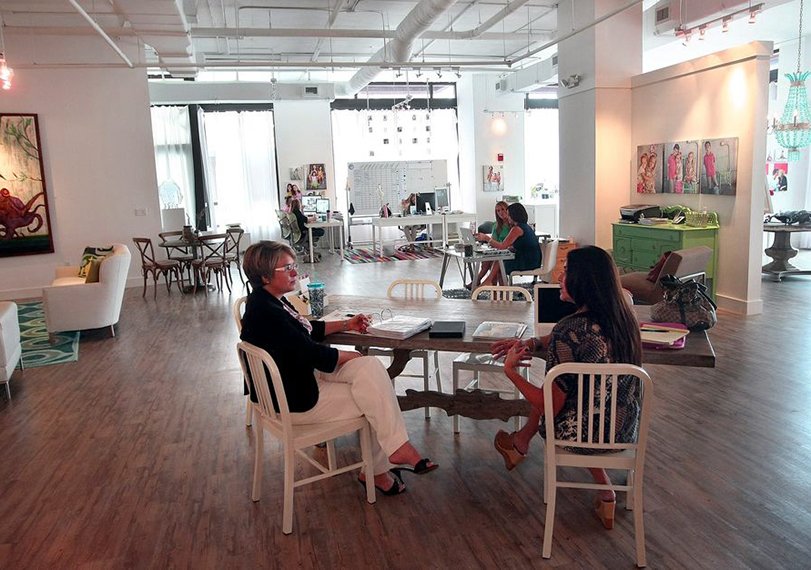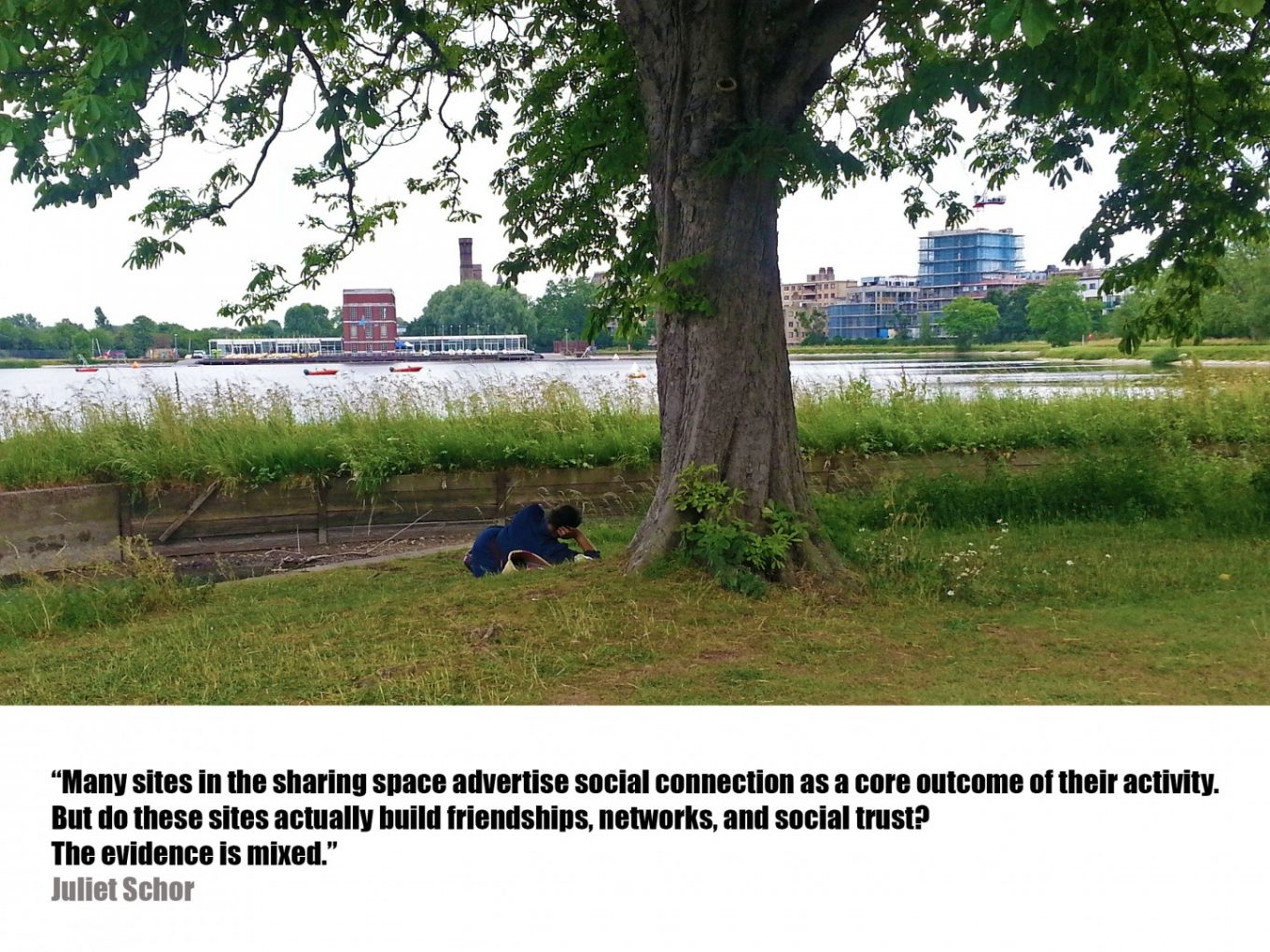
Why share ?
Motives for participating in the new sharing economy differ, which is not surprising given the diversity of platforms and activities. Some participants are drawn by the trendiness or novelty of the platforms. It is, however, important to recognize that the novelty about which many participants (and platforms) talk can be an expression of classism and racism. Sharing is not just a relic of pre-modern societies; such practices remain more common in working-class, poor, and minority communities. The discourse of novelty employs a false universalism that can be alienating to people who have maintained non-digital sharing practices in their daily lives.
Beyond novelty and the pull of new technologies, participants tend to be motivated by economic, environmental, and social factors.[10.Technophilia also spurs participation. People enjoy the sophisticated interfaces offered by many sites and like using the internet to do things quickly and easily. Many users have been “digitally primed” by years of sharing files or contributing information online.] Sharing economy sites are generally lower in cost than market alternatives. Particularly with P2P sites, value can be redistributed across the supply chain to producers and consumers and away from “middlemen,” in part because producers’ costs are lower. An Airbnb host, for example, can deliver a room more cheaply than a hotel. The platforms’ fees are also lower than what established businesses extract in profits. (Airbnb’s maximum fee is 15%.) Service and labor exchange platforms, whether they are time banks or for-profit platforms like Task Rabbit, extract far less value than traditional agencies that arrange child care, concierge services, or home health care aides. The platforms also allow people to earn money in ways that had not previously been safely or easily available.
Many sites advertise themselves as green and present sharing as a way to reduce carbon footprints. It is a truism among “sharers” that sharing is less resource intensive than the dominant ways of accessing goods and services (e.g., hotels, taxis, shopping malls) because of the assumed reduction in demand for new goods or facilities. The actual environmental impacts of the sites are far more complicated, however, as will be discussed in the following section.
The desire to increase social connections is also a common motivation. Many sites advertise this feature of their activities, and participants often articulate a desire to meet new people or get to know their neighbors. While heartwarming anecdotes about making new friends are plentiful, many platforms fail to deliver durable social ties. For instance, a recent study of carsharing found that the two parties to the transaction often never met on account of remote access technology.[11.Anny Fenton, “Making Markets Personal: Exploring Market Construction at the Micro Level in the Car-sharing and Time Bank Markets,” Unpublished paper, Harvard University, 2013.]
Finally, a commitment to social transformation is an important motivator. My Connected Consumption Research Team has found that many respondents emphasize the value of sharing and collaboration, and some are highly critical of capitalism, the operation of the market, and the business-as-usual economy [12.Dubois, Schor, and Carfagna, op. cit.] Ideological motivation, however, varies by site, with less exhibited by earners on platforms such as Airbnb and RelayRides and more by participants in time banks and food swaps.
How Green is the Sharing Economy?
Most sharing economy websites advertise their green credentials, and many users care about their ecological impact. The ecological benefits of sharing are often seen as obvious: secondary markets reduce demand for new goods, so footprints go down. Staying in existing homes reduces the demand for new hotels just as toolsharing reduces new tool purchases. However, despite the widespread belief that the sector helps to reduce carbon emissions, there are almost no comprehensive studies of its impact. At this point, they are long overdue.
An exception is a recent study of carsharing.[13.Elliott W. Martin and Susan A. Shaheen, Greenhouse Gas Impacts of Car Sharing in North America, Mineta Transportation Institute Report 09-11 (San Jose, CA: Mineta Transportation Institute, 2010). ]It found a measurable reduction in greenhouse gas emissions, but only because of substantial reductions from a small fraction of households. For the majority, carsharing, by expanding access to cars, increased emissions.
The ordinary assumptions about ecological impacts are generally about the first, visible shifts made by a consumer—purchasing used products rather than new ones, or staying in a private home rather than a hotel. To assess overall ecological impacts, however, we have to consider ripple effects. What does the seller or the host do with the money earned? She may use the money to buy high-impact products. Does the appearance of a market for used goods lead people to buy more new things that they intend to sell later? If travel becomes less expensive, do people do more of it? All of these effects raise ecological and carbon footprints.
There is also the question of impacts at the level of the economy as a whole. The platforms are creating new markets that expand the volume of commerce and boost purchasing power. The larger, for-profit companies are claiming to generate substantial business and income for their providers. If so, they are likely creating economic activity that would not have existed otherwise—more travel, more private automobile rides—and not just shifting purchasing from one type of provider to another. My students and I have found that Airbnb users are taking more trips now and that the availablity of cheap ride services is diverting some people from public transportation. That means the platforms result in higher carbon emissions, because their services use energy. The companies can’t have it both ways—creating new economic activity and reducing carbon emissions—because the two are closely linked.
Does the Sharing Economy Build Social Capital?
While the discourse of novelty in this sector is overrated, there is something new afoot: what I call “stranger sharing.” Although there are exceptions (e.g., elite travelers in ancient Greece), people have historically limited sharing to within their own social networks. Today’s sharing platforms facilitate sharing among people who do not know each other and who do not have friends or connections in common. Stranger sharing entails higher degrees of risk, and many of today’s exchanges are quite intimate—sharing one’s home or car, going into strangers’ homes to do work, or eating food prepared by unknown cooks. The platforms reduce risk by posting information on users via feedback and ratings. This points to a second novel dimension—the use of digital technology to reduce transactions costs, create opportunities in real time, and crowdsource information. The uniqueness of this new sharing economy is that it mobilizes technology, markets, and the “wisdom of crowds” to bring strangers together.

Many sites in the sharing space advertise social connection as a core outcome of their activity. But do these sites actually build friendships, networks, and social trust? The evidence is mixed. Stanford sociologist Paolo Parigi and his colleagues have found that Couchsurfing does, in fact, lead to new friendships. However, the ability of the platform to create such connections, especially close ones, has declined since its inception in 2003. Users have become “disenchanted” as the relationships they form are now more casual and less durable.[14.Paolo Parigi and Bogdan State, “Disenchanting the World: The Impact of Technology on Relationships,” Unpublished paper, Stanford University, n.d.] Other studies have found that social connection can be elusive, with time bank participants expressing disappointment in the degree of social connection they gained and RelayRides users describing their interactions as “anonymous” and “sterile.”[15. Dubois, Schor, and Carfagna, op. cit.; Fenton, op. cit.]
The role of ratings and reputational information is at the center of questions about social capital. The conventional wisdom is that the provision of crowdsourced information on users is what leads people to feel safe about interacting in intimate ways with strangers.[16. Recent studies have found inaccuracies in ratings systems, especially the tendency to overrate positive features and under-report bad experiences. A colleague and I review recent studies in Juliet B. Schor and Connor Fitzmaurice, “Collaborating and Connecting: The Emergence of a Sharing Economy,” in Handbook on Research on Sustainable Consumption, eds. Lucia Reisch and John Thogersen (Cheltenham, UK: Edward Elgar), 2015.] Parigi’s research, however, uncovered a paradox: the more reputational information the site provided about people, the less users formed strong bonds. Venturing into unknown territory with strangers may be more of the appeal of some sites than their ability to master a utilitarian calculus of risk and reward.
Sharing economy sites can also reproduce class, gender, and racial biases and hierarchies. In our research at a food swap, my team and I found that cultural capital, a type of class privilege, limited the trades members were willing to make. Only participants with the “right” offerings, packaging, appearance, or “taste” received offers or, in some cases, even felt comfortable returning. In our time bank research, we found that some people screen potential trading partners by grammar and education, and that many highly educated people were unwilling to offer their most valuable skills (like programming or web design), preferring instead to act as amateur electricians or manual workers.[17. Juliet B. Schor et al., “Paradoxes of Openness and Distinction in the Sharing Economy,” Unpublished paper, Boston College, 2014.] A recent study also reported evidence of racial discrimination among Airbnb users, finding that non-black hosts were able to charge 12% more than blacks for comparable properties.[18. Benjamin Hardin and Michael Luca, “Digital Discrimination: The Case of Airbnb,” Harvard Business School Working Papers, 2014.]
Debating The Sharing Economy Part 3
Debating The Sharing Economy Part 1
Endonotes
Juliet Schor is Professor of Sociology at Boston. She is also a member of the MacArthur Foundation Connected Learning Research Network. Schor’s research focuses on issues of time use, consumption and environmental sustainability. A graduate of Wesleyan University, Schor received her Ph.D. in economics at the University of Massachusetts. Before joining Boston College, she taught at Harvard University for 17 years, in the Department of Economics and the Committee on Degrees in Women’s Studies. In 2014 Schor received the American Sociological Association’s award for Public Understanding of Sociology. She also served as the Matina S. Horner Distinguished Visiting Professor at the Radcliffe Institute at Harvard University.
Schor is a former Guggenheim Fellow and recipient of the 2011 Herman Daly Award from the US Society for Ecological Economics. She is a former Trustee of Wesleyan University, an occasional faculty member at Schumacher College, and a former fellow of the Brookings Institution.
She is a co-founder of the Center for a New American Dream (newdream.org), a national sustainability organization where she served on the board for more than 15 years. She is also on the board of the Better Future Project, one of the country’s most successful climate activism organizations. She is a co-founder of the South End Press and the Center for Popular Economics.
Schor has lectured widely throughout the United States, Europe and Japan to a variety of civic, business, labor and academic groups. She appears frequently on national and international media, and profiles on her and her work have appeared in scores of magazines and newspapers, including The New York Times, Wall Street Journal, Newsweek, and People magazine. She has appeared on 60 Minutes, the Today Show, Good Morning America, The Early Show on CBS, numerous stories on network news, as well as many other television and radio news programs.































